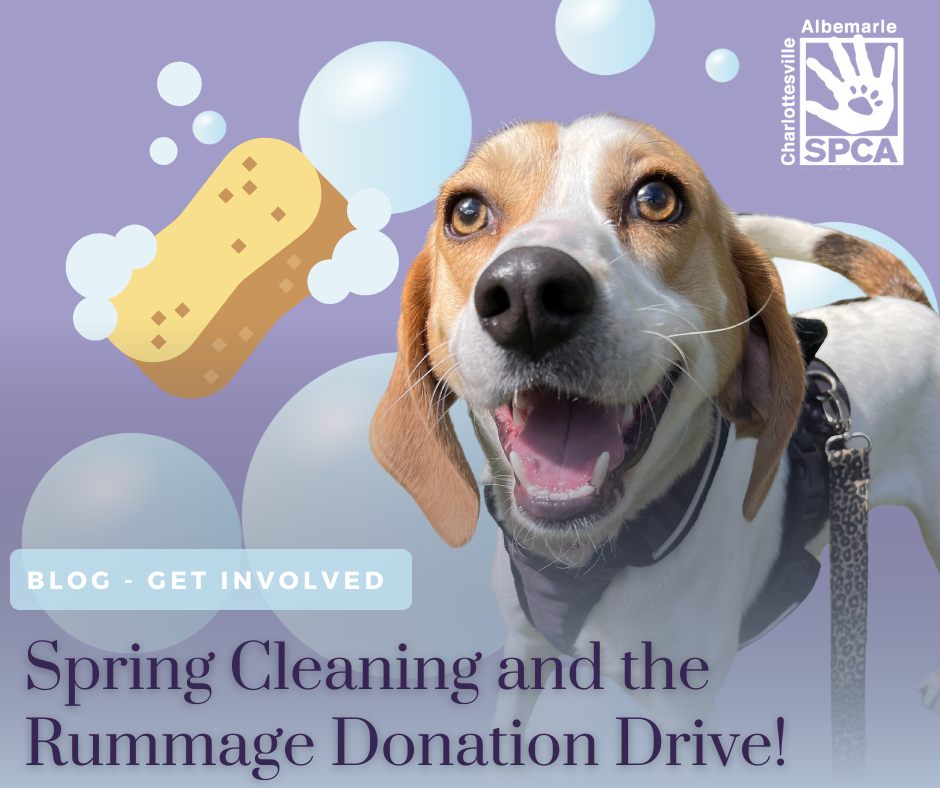Spring is in full bloom, and it’s the perfect time of year to participate in some Spring Cleaning! This year, don’t forget to include your pets in your seasonal reset. Here are some steps you can take to ensure your furry friends have their best and safest summer yet!
- Deep Cleaning
Start your spring cleaning with a focus on your pet’s living spaces. This is a perfect time of year to deep clean any crates, bedding, litter boxes or furniture that your pet uses, as well as their collars, leashes, toys and food bowls. Be sure to use pet-safe detergents – baking soda, vinegar, dawn dish soap, as well as pet-safe brands like Nature’s Miracle are all appropriate. Bleach, ammonia and isopropyl alcohol can all be toxic to pets if ingested. Make sure to know what’s appropriate for your pet’s species, as well – aerosol room sprays are safe for cats and dogs, but are not safe to use around pet birds, for example. Essential oils can also be tricky – while some are considered safe for use around pets, essential oils like Ylang Ylang, Eucalyptus, Tea Tree and others can be toxic, and can cause symptoms ranging from GI upset to respiratory issues following exposure. To be safe, check with your veterinarian or the ASPCA’s Animal Poison Control Hotline before using essential oils or cleaning products around animals!
- Pet-Proofing Your Home and Yard
While you’re cleaning, be proactive about keeping potentially hazardous items secure: wires, chemicals, medication, etc should all be kept in pet-proofed areas. Even pets with no history of indiscriminate eating or chewing can become victims of their own curiosity! If you have indoor plants, enjoy cut flowers, or your pet spends time in your yard with you, keep yourself informed about what plants in your home or landscaping are toxic to pets. Lilies, for instance, are extremely poisonous to cats. All species of true lily can cause kidney damage or failure; ingesting even a small amount of any part of the plant (including grooming pollen off of their fur), can cause kidney injury and even death. For more about plants that are toxic to pets, check out this article.
If you believe your pet has ingested a poisonous plant, call the pet poison hotline at:
(888) 426-4435
- Organize and Update Pet Supplies
Go through your pet’s supplies, checking for any wear and tear on collars, leashes, and toys. Dispose of damaged items and replace them if necessary. Tidy up your storage areas, making sure everything your pet needs is easily accessible!
- Pet Health Check-Up
Spring is an ideal time to schedule a vet visit to ensure your pet is healthy and ready for the warmer months ahead. As we enter the warm season, it’s more important than ever to make sure your pets are protected against fleas, ticks, heartworms, and other parasites. Ask your veterinarian about what preventatives are best for you and your pet, and set up reminders on your phone or calendar to ensure they are consistently protected. Spring is also a great time to give pets a thorough grooming to remove their winter undercoat, check for any skin irritation or lesions that may come with springtime allergies, and start the summer off fresh!
The Rummage Store’s Spring Donation Drive
Once you’ve cleaned out your pet’s space and your home, you’ll likely find items that are no longer needed, and now is a great time to donate! The SPCA Rummage Store is having a Spring Donation Drive this Friday through Sunday, May 17th through 19th, from 12-6pm each day. Donations will be accepted at the Shelter’s campus at 3355 Berkmar Drive, as well as at the Rummage store at 364 Hillsdale Drive. Donors who drop off during these days will receive a raffle ticket for a chance to win a $50 shopping spree at the Rummage store! Spring cleaning can be a fulfilling project that benefits not only you and your pets, but also the broader community of animals and the people who support them. So, let’s get cleaning!




Leave A Comment